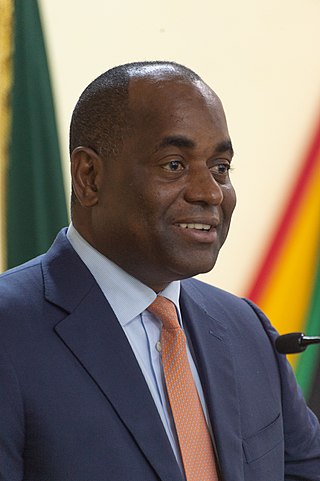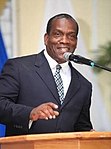The first written records in the history of Dominica began in November 1493, when Christopher Columbus spotted the island. Prior to European contact, Dominica was inhabited by the Arawak. Dominica was a French colony from 1715 until the end of the Seven Years' War in 1763, and then became a British colony from 1763 to 1978. It became an independent nation in 1978.

The politics of Dominica takes place in a framework of a parliamentary representative democratic republic, whereby the Prime Minister of Dominica is the head of government, and of a multi-party system. Executive power is exercised by the government. Legislative power is vested in both the government and the House of Assembly. The Judiciary is independent of the executive and the legislature.

The politics of Barbados function within a framework of a parliamentary republic with strong democratic traditions; constitutional safeguards for nationals of Barbados include: freedom of speech, press, worship, movement, and association.

The Democratic Labour Party (DLP), colloquially known as the "Dems", is a political party in Barbados, established in 1955. It was the ruling party from 15 January 2008 to 24 May 2018 but faced an electoral wipeout in the 2018 general election which left it with no MPs.

Roosevelt Skerrit is a Dominican politician who has been Prime Minister of Dominica since 2004; he has also been the Member of Parliament for the Vieille Case constituency since 2000. Regionally, he has served as the chairman of the Organisation of Eastern Caribbean States (OECS) and most recently as chairman of the Caribbean Community (CARICOM) in 2010. Skerrit is currently the longest-serving prime minister of Dominica.

Elections in Dominica have been taking place since 1832. Dominica elects on national level a legislature. The House of Assembly has 32 members, 21 members elected for a five-year term in single-seat constituencies, 9 appointed senators, the Speaker and 1 ex officio member. A head of state—the president—is elected by the House of Assembly.
Earl Michael Williams is a Dominican politician who was Leader of the Opposition in Dominica and political Leader of the United Workers' Party from 2007 to 2008.
The Dominica Freedom Party (DFP) is a conservative political party in Dominica. It shares much of the same socially and economically conservative principles as the Conservative Party in the UK. The party has been led by Bernard Hurtault since 2021.

The Dominica Labour Party is a centre-left social-democratic political party in Dominica.

The United Workers' Party is a centrist political party in Dominica. As of the 2022 general election, the party is not represented in the House of Assembly of Dominica, after boycotting the general election. The past Leader of the Opposition in the Assembly is Lennox Linton.

Edison Chenfil James is a Dominican politician who was the prime minister of Dominica from June 14, 1995, to February 3, 2000, as well as the member of parliament for the Marigot constituency from 1990. He graduated from the Dominica Grammar School. He has a BSc degree in botany from the University of East London, a MSc degree in biochemistry from the University of Reading and a post graduate diploma in crop protection technology from Imperial College. He worked in a number of local and regional institutions including the Caribbean Development Bank, but it was as manager of the Dominica Banana Marketing Company that he rose to prominence on the island. He was instrumental in resuscitating the island's critical banana industry which had been decimated by Hurricane David. James has been active in regional cricket as an administrator and was the manager of the Windward Islands cricket team and the Combined Islands cricket team. He is a member of the Rotary Club.

Charles Angelo Savarin, DAH is a politician from Dominica who served as President of Dominica from 2013 to 2023. He is a member of the Dominica Labour Party and served for a time as Minister for National Security, Immigration, Labour and the Public Service.

The House of Assembly is the legislature of Dominica. It is established by Chapter III of the Constitution of Dominica, and together with the President of Dominica constitutes Dominica's Parliament. The House is unicameral, and consists of twenty-one Representatives, nine senators, and the Attorney General as an ex officio member. The Speaker of the House becomes the thirty-second member if chosen from outside the membership of the House.

General elections were held in Dominica on 5 May 2005. The result was a victory for the ruling Dominica Labour Party, which won 12 of the 21 seats in the House of Assembly. The opposition United Workers' Party unsuccessfully made legal challenges to several of the constituency results.

The Leader of the Opposition of the Commonwealth of Dominica is the Member of Parliament who leads the Official Opposition in the House of Assembly of Dominica.

Federal elections were held in the West Indies Federation for the first and only time on 25 March 1958. The result was a victory for the West Indies Federal Labour Party, which won 25 of the 45 seats in the House of Representatives.

General elections were held in Dominica on 8 December 2014 to elect the 21 members of the House of Assembly. Prime Minister Roosevelt Skerrit announced the election date on 5 November 2014 and Nomination Day was held on 19 November. Under Dominica's electoral system, the Prime Minister has the authority to call elections at any time and is only required to give a minimum of twenty-five days' notice.

General elections were held in Barbados on 24 May 2018. The result was a landslide victory for the opposition Barbados Labour Party (BLP), which won all 30 seats in the House of Assembly, resulting in BLP leader Mia Mottley becoming the country's first female Prime Minister. The BLP's victory was the first time a party had won every seat in the House of Assembly. Previously, the most one-sided result for a Barbadian election had been in 1999, when the BLP won 26 of the 28 seats. The BLP's 73.5 percent vote share was also the highest on record.

General elections were held in Saint Lucia on 26 July 2021, having been constitutionally required by 12 October 2021. Voters elected all 17 members of the House of Assembly. The result was a victory for the opposition Saint Lucia Labour Party, which won 13 of the 17 seats in the House, while the ruling United Workers Party lost nine of its eleven seats, its worst result since 1997. It was the fourth consecutive election in which the incumbent government was defeated.

Snap general elections were held in Dominica on 6 December 2022. Boycotted by the opposition United Workers' Party (UWP) and Dominica Freedom Party (DFP), the ruling Dominica Labour Party led by Roosevelt Skerrit, who had been prime minister since 2004, retained its supermajority in the House of Assembly by winning 19 of the 21 elected seats. Turnout was low at only 32%, the first time in Dominican history that less than half of eligible voters participated in a general election.

















